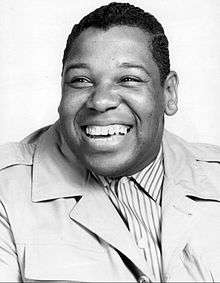Johnny Brown (actor)
John Brown (born June 11, 1937) is an American actor and singer. Brown is a nightclub and stage performer as well as a comic actor, and a regular cast member of the television series Laugh-in. Brown is mostly remembered for his chubby physique, wide ingratiating smile, mobile facial expressions, and easy pleasant joking style. Brown is most famous, however, for his role as building superintendent Nathan Bookman on the 1970s CBS sitcom, Good Times. Bookman was often the brunt of fat jokes via the show's main character J. J. Evans (Jimmie Walker). Brown portrayed Bookman until the series was cancelled in 1979. Other television shows Brown has appeared on include The Flip Wilson Show, The Jeffersons, Family Matters, Sister, Sister, The Jamie Foxx Show and Martin. Brown also used to go to school with Walter Dean Myers when he lived in Harlem as a boy.
Johnny Brown | |
|---|---|
 Brown on Laugh-In in 1971. | |
| Born | June 11, 1937 St. Petersburg, Florida, U.S. |
| Other names | John Brown |
| Occupation | Actor, singer |
| Years active | 1961–2013 |
| Children | 2, including Sharon Brown |
In the early 1970s, Brown starred in a television commercial for the Write Brothers pen, a short-lived product of the Papermate pen company. The commercial consisted of an elaborate musical number, "Write On, Brothers, Write On", led by Brown as a schoolteacher who encourages his chorus line of students to use this pen for their school assignments.
In 1997, Brown contributed his voice to the introduction of the compilation album Comedy Stew: The Best of Redd Foxx. In the introduction, Brown tells of how Norman Lear had considered Brown to play the role of Lamont in Sanford and Son, but was unavailable to do so because of his prior commitment to Laugh-In, leading Lear to give the role to Demond Wilson instead.
Records
Johnny Brown began recording as a singer as late as 1961, after having toured with Sam "The Man" Taylor since 1958. His first release was on Columbia Records, "Walkin', Talkin', Kissin' Doll" b/w "Sundown". He was only about 24 at the time. The promotional release was accompanied with a special insert describing his background (see picture). His next record happened in early 1968 on Atlantic Records, "You're Too Much in Love With Yourself" b/w "Don't Dilly Dally, Dolly", the latter showing off his impression skills as Louis Armstrong. That release had initially been available on Crest Records.

References
External links